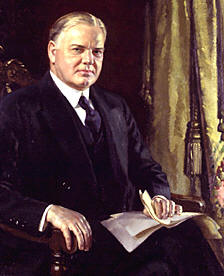Meaning of Constitution and Bill of Rights
Former President Herbert Hoover
San Diego, CA
Constitution Day
September 17, 1935
Our Constitution is not alone the working plan of a great Federation
of States under representative government. There is embedded in it
also the vital principles of the American system of liberty. That
system is based upon certain inalienable freedoms and protections
which not even the government may infringe and which we call the
Bill of Rights. It does not require a lawyer to interpret those
provisions.
They are as clear as the Ten Commandments. Among others the freedom
of worship, freedom of speech and of the press, the right of
peaceable assembly, equality before the law, just trial for crime,
freedom from unreasonable search, and security from being deprived
of life, liberty, or property without due process of law, are the
principles which distinguish our civilization. Herein are the
invisible sentinels which guard the door of every home from invasion
of coercion, of intimidation and fear. Herein is the expression of
the spirit of men who would be forever free.
These rights were no sudden discovery, no over-night inspiration.
They were established by centuries of struggle in which men died
fighting bitterly for their recognition. Their beginnings lie in the
Magna Charta of Runny-mede five hundred and seventy years before the
Constitution was written Down through the centuries the Habeas
Corpus, the “Petition of Rights,” the “Declaration of Rights,” the
growth of the fundamental maxims of the Common Law, marked their
expansion and security. Our forefathers migrated to America that
they might attain them more fully. When they wrote the Declaration
of Independence they boldly extended these rights. Before the
Constitution could be ratified patriotic men who feared a return to
tyranny, whose chains had been thrown off only after years of toil
and bloody war, insisted that these hard-won rights should be
incorporated in black and white within the Constitution – and so
came the American Bill of Rights.
In the hurricane of revolutions which have swept the world since the
Great War, men, struggling with the wreckage and poverty of that
great catastrophe and the complications of the machine age, are in
despair surrendering their freedom for false promises of economic
security. Whether it be Fascist Italy, Nazi Germany, Communist
Russia, or their lesser followers, the result is the same. Every day
they repudiate every principle of the Bill of Rights. Freedom of
worship is denied. Freedom of speech is suppressed. The press is
censored and distorted with propaganda. The right of criticism is
denied. Men go to jail or the gallows for honest opinions. They may
not assemble for discussion. They speak of public affairs only in
whispers. They are subject to search and seizure by spies and
inquisitors who haunt the land. The safeguards of justice in trial
or imprisonment are set aside. There is no right in one’s savings or
one’s own home which the government need respect.
Here is a form of servitude, of slavery – a slipping back toward the
Middle Ages...
Even in America, where liberty blazed brightest and by its glow shed
light on all the other, it is besieged from without and challenged
from within. Many, in honest belief, hold that we cannot longer
accommodate the growth of science, technology and mechanical power
to the Bill of Rights and our form of government. With that I do not
agree. Men’s inventions cannot be of more value than men themselves.
But it would be better that we sacrifice something of economic
efficiency than to surrender these primary liberties. In them lies a
spiritual right of men. Behind them is the conception which is the
highest development of the Christian faith – the conception of
individual freedom with brotherhood. From them is the fullest
flowering of individual human personality.
Nor is respect for the Bill of Rights o fetter upon progress. It has
been no dead hand that has carried the living principles and their
safeguards we have amended the Constitution many times in the past
century to meet the problems of growing civilization. We will no
doubt do so many times again. Always groups of audacious men in
government or out will attempt to consolidate privilege against
their fellows. New inventions and new ideas require the constant
remolding of our civilization. The functions of government must be
readjusted from time to time to restrain the strong and protect the
weak. That is the preservation of liberty itself. We ofttimes
interpret some provisions of the Bill of Rights so that they
override others. They indeed jostle each other in course of changing
national life – but their respective domains can be defined by
virtue, by reason, and by law. And the freedom of men is not
possible without virtue, reason and law.

